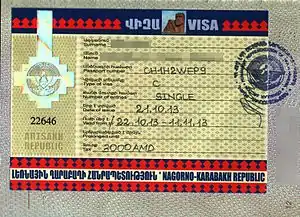Non-visa travel restrictions
Many countries have entry restrictions on foreigners that go beyond the common requirement of having either a valid visa or a visa exemption. Such restrictions may be health related or impose additional documentation requirements on certain classes of people for diplomatic or political purposes.
List of common non-visa travel restrictions
Blank passport pages
Many countries require a minimum number of blank pages to be available in the passport being presented, typically one or two pages.[1] Endorsement pages, which often appear after the visa pages, are not counted as being available.
Vaccination

Many African countries, including Angola, Benin, Burkina Faso, Cameroon, Central African Republic, Chad, Democratic Republic of the Congo, Republic of the Congo, Côte d'Ivoire, Equatorial Guinea, Gabon, Gambia, Ghana, Guinea, Liberia, Mali, Mauritania, Niger, Rwanda, São Tomé and Príncipe, Senegal, Sierra Leone, South Sudan, Uganda, and Zambia, require all incoming passengers to have a current International Certificate of Vaccination or Prophylaxis, as does the South American territory of French Guiana.[2]
Some other countries require vaccination only if the passenger is coming from an infected area or has visited one recently.[3]
Passport validity length
In the absence of specific bilateral agreements, countries requiring passports to be valid for at least 6 more months on arrival include Afghanistan, Algeria, Anguilla, Bahrain,[4] Bhutan, Botswana, British Virgin Islands, Brunei, Cambodia, Cameroon, Cape Verde, Cayman Islands, Central African Republic, Chad, Comoros, Costa Rica, Côte d'Ivoire, Curaçao, Ecuador, Egypt, El Salvador, Equatorial Guinea, Fiji, Gabon, Guinea Bissau, Guyana, Haiti, Indonesia, Iran, Iraq, Israel,[5] Jordan, Kenya, Kiribati, Kuwait, Laos, Madagascar, Malaysia, Marshall Islands, Mongolia, Myanmar, Namibia, Nepal, Nicaragua, Nigeria, Oman, Palau, Papua New Guinea, Philippines, Qatar, Rwanda, Samoa, Saudi Arabia, Singapore, Solomon Islands, Somalia, Sri Lanka, Sudan, Suriname, Tanzania, Thailand, Timor-Leste, Tokelau, Tonga, Turkey, Tuvalu, Uganda, United Arab Emirates, Vanuatu, Venezuela, and Vietnam.[6]
Countries requiring passports valid for at least 4 months on arrival include Micronesia and Zambia.
Countries requiring passports valid for at least 3 months on arrival include Albania, Honduras, North Macedonia, Panama, and Senegal.
Countries requiring passports with a validity of at least 3 months beyond the date of intended departure include Azerbaijan, Bosnia and Herzegovina, Montenegro, Nauru, Moldova, and New Zealand. Similarly, the EEA countries of Iceland, Liechtenstein, Norway, all European Union countries (except the Republic of Ireland) together with Switzerland and the United Kingdom also require 3 months validity beyond the date of the bearer's intended departure unless the bearer is an EEA or Swiss national.
Bermuda requires passports to be valid for at least 45 days upon entry.
Countries that require a passport validity of at least one month beyond the date of intended departure include Eritrea, Hong Kong, Lebanon, Macau, the Maldives[7] and South Africa.
Other countries require either a passport valid on arrival or a passport valid throughout the period of the intended stay. Some countries have bilateral agreements with other countries to shorten the period of passport validity required for each other's citizens[8][9] or even accept passports that have already expired (but not been cancelled).[10]
Criminal record
Some countries, including Australia, Canada, Fiji, New Zealand and the United States,[11] routinely deny entry to non-citizens who have a criminal record.
Persona non grata
The government of a country can declare a diplomat persona non grata, banning their entry into that country. In non-diplomatic use, the authorities of a country may also declare a foreigner persona non grata permanently or temporarily, usually because of unlawful activity.[12]
Israeli stamps

Kuwait,[13] Lebanon,[14] Libya,[15] Sudan,[16] Syria,[17] and Yemen[18] do not allow entry to people with passport stamps from Israel or whose passports have either a used or an unused Israeli visa, or where there is evidence of previous travel to Israel such as entry or exit stamps from neighbouring border posts in transit countries such as Jordan and Egypt.
To circumvent this Arab League boycott of Israel, the Israeli immigration services have now mostly ceased to stamp foreign nationals' passports on either entry to or exit from Israel (unless the entry is for some work-related purposes). Since 15 January 2013, Israel no longer stamps foreign passports at Ben Gurion Airport. Passports are still (as of 22 June 2017) stamped at Erez when passing into and out of Gaza.
The Saudi Commission for Tourism and National Heritage claims that having an Israeli stamp does not disqualify someone from visiting Saudi Arabia.[19]
Iran refuses admission to holders of passports containing an Israeli visa or stamp that is less than 12 months old.
Armenian ethnicity

Due to a state of war existing between Armenia and Azerbaijan, the government of Azerbaijan not only bars entry of Armenian citizens, but also all citizens and nationals of any other country who are of Armenian descent, into the Republic of Azerbaijan.[20][21]
Azerbaijan also strictly bans any visit by foreign citizens to the separatist region of Nagorno-Karabakh[22] (the de facto independent Republic of Artsakh), its surrounding territories, and the Azerbaijani exclaves of Karki, Yuxarı Əskipara, Barxudarlı, and Sofulu which are de jure part of Azerbaijan but under the control of Armenia, without the prior consent of the government of Azerbaijan. Foreign citizens who enter these territories will be permanently banned from entering the Republic of Azerbaijan[23] and will be included in their "list of personae non gratae".[24] As of 2 September 2019, the list mentioned 852 people.
Upon request, the authorities of the largely unrecognised Republic of Artsakh may attach their visa and/or stamps to a separate piece of paper in order to avoid detection of travel to their territory.
Biometrics
.jpg.webp)
Several countries mandate that all travellers, or all foreign travellers, be fingerprinted on arrival and will refuse admission to or even arrest travellers who refuse to comply. In some countries, such as the United States, this may apply even to transit passengers who merely wish to quickly change planes rather than go landside.[25]
Fingerprinting countries include Afghanistan,[26][27] Argentina,[28] Brunei, Cambodia,[29] China,[30] Ethiopia,[31] Ghana, Guinea,[32] India, Japan,[33][34] Kenya (both fingerprints and a photo are taken),[35] Malaysia upon entry and departure,[36] Paraguay, Saudi Arabia,[37] Singapore, South Korea,[38] Taiwan, Thailand,[39] Uganda[40] and the United States.
Many countries also require a photo be taken of people entering the country. The United States, which does not fully implement exit control formalities at its land frontiers (although long mandated by its legislature),[41] [42] [43] intends to implement facial recognition for passengers departing from international airports to identify people who overstay their visa.[44]
Together with fingerprint and face recognition, iris scanning is one of three biometric identification technologies internationally standardised since 2006 by the International Civil Aviation Organization (ICAO) for use in e-passports[45] and the United Arab Emirates conducts iris scanning on visitors who need to apply for a visa.[46][47] The United States Department of Homeland Security has announced plans to greatly increase the biometric data it collects at US borders.[48] In 2018, Singapore began trials of iris scanning at three land and maritime immigration checkpoints.[49][50]
See also
References
- "Country Information". Bureau of Consular Affairs, U.S. Department of State. Retrieved 11 September 2017.
- Agence régionale de sante Guyane (2 September 2018). "Fièvre jaune" (in French). Retrieved 27 August 2019.
- Country list - Yellow fever vaccination requirements and recommendations; and malaria situation; and other vaccination requirement
- Bahrain government website
- "PASSPORTS AND VISA | GoIsrael - the Official Website of Tourism to Israel".
- Timatic
- "Maldives Reduces Passport Validity Requirement of Minimum 6 Months to Just 1 Month". Corporate Maldives. Retrieved 30 January 2021.
- "Foreign Affairs Manual, 9 FAM 403.9-3(B)(2) f". U.S. Department of State. Retrieved 10 October 2017.
- "How long should my passport be valid when traveling to the United States?" (PDF). U.S. Department of State. Retrieved 10 October 2017.
- "Countries whose citizens are allowed to enter Turkey with their expired passports". Ministry of Foreign Affairs. Republic of Turkey. Archived from the original on 8 October 2015. Retrieved 6 July 2018.
Countries whose citizens are allowed to enter Turkey with their expired passports: 1. Germany – Passports expired within the last year / ID’s expired within the last year, 2. Belgium - Passports expired within the last 5 years, 3. France - Passports expired within the last 5 years, 4. Spain - Passports expired within the last 5 years, 5. Switzerland - Passports expired within the last 5 years, 6. Luxemburg - Passports expired within the last 5 years, 7. Portugal - Passports expired within the last 5 years, 8. Bulgaria – Valid ordinary passport
- Government of Canada -- Overcome criminal convictions
- Mar 18, INDIATIMES NEWS NETWORK /; 2005; Ist, 12:31. "No entry for Modi into US: visa denied | India News - Times of India". The Times of India. Retrieved 29 September 2020.CS1 maint: numeric names: authors list (link)
- "Travel Report - Kuwait". Voyage.gc.ca. 16 November 2012. Retrieved 1 July 2013.
- Travel Advice for Lebanon - Australian Department of Foreign Affairs and Trade Archived 2008-12-24 at the Wayback Machine and Lebanese Ministry of Tourism Archived 2009-03-27 at the Wayback Machine
- "Travel Advice for Libya - Australian Department of Foreign Affairs and Trade". Smartraveller.gov.au. Archived from the original on 22 June 2013. Retrieved 1 July 2013.
- "Travel Advice for Sudan - Australian Department of Foreign Affairs and Trade". Smartraveller.gov.au. Archived from the original on 5 July 2013. Retrieved 1 July 2013.
- Travel Advice for Syria - Australian Department of Foreign Affairs and Trade Archived 2008-12-19 at the Wayback Machine and Syrian Ministry of Tourism
- "Travel Advice for Yemen - Australian Department of Foreign Affairs and Trade". Smartraveller.gov.au. Archived from the original on 20 August 2011. Retrieved 1 July 2013.
- "It is possible to visit KSA with an Israeli stamp on the passport?". Visit Saudi. Retrieved 7 October 2019.
- Azerbaijan Country Page Archived 2009-03-08 at the Wayback Machine. NCSJ: Advocates on behalf of Jews in Russia, Ukraine, the Baltic States & Eurasia. Accessed 23 May 2010.
- Azerbaijan doesn't allow Armenians in the country. - Panarmenian.net
- "Azerbaijan Country Page of the NCSJ (advocates on behalf of Jews in Russia, Ukraine, the Baltic States & Eurasia) accessed 23 May 2010". Archived from the original on 8 March 2009. Retrieved 26 May 2010.
- "Warning for the foreign nationals wishing to travel to the occupied territories of the Republic of Azerbaijan". Ministry of Foreign Affairs of the Republic of Azerbaijan. Archived from the original on 1 December 2017. Retrieved 23 November 2017.
- "List of foreign citizens illegally visited occupied territories of the Republic of Azerbaijan". Ministry of Foreign Affairs of the Republic of Azerbaijan. Archived from the original on 10 July 2017. Retrieved 16 September 2019.
- Calder, Simon (24 April 2017). "Airline lobbying for a relaxation of draconian rules for London-Auckland travellers". The Independent. Retrieved 7 July 2018.
Travellers heading west from the UK to New Zealand may soon be able to avoid the onerous requirement to clear US border control during the refuelling stop at Los Angeles airport (LAX). Unlike almost every other country in the world, the US insists on a full immigration check even for passengers who simply intend to re-board their plane to continue onwards to a foreign destination. Air New Zealand, which flies daily from Heathrow via Los Angeles to Auckland, says there are currently “strict requirements for travellers” in transit at LAX. Through passengers to Auckland on flight NZ1 or Heathrow on NZ2 must apply in advance for an ESTA (online visa) even though they have no intention of staying in the US. They also have to undergo screening by the Transportation Security Administration.
- "How to enter Afghanistan. The Entry Requirements for Afghanistan - CountryReports". Countryreports.org.
- Nordland, Rod (19 November 2011). "In Afghanistan, Big Plans to Gather Biometric Data". Nytimes.com.
- "Argentina strengthens migratory control". Archived from the original on 2 December 2013.
- "Cambodia Foreign Entry Requirements". Us-passport-information.com.
- "China to Start Fingerprinting Foreign Visitors". Air Canada. 31 January 2019. Retrieved 7 July 2018.
Effective April 27, 2018, border control authorities at all of China’s ports of entry, including its airports, will start collecting the fingerprints of all foreign visitors aged between 14 and 70. Diplomatic passport holders and beneficiaries of reciprocal agreements are exempted..
- "Äthiopien: Reise- und Sicherheitshinweise". Auswaertiges-amt.de.
- "Japan fingerprints foreigners as anti-terror move". Reuters. 20 November 2016. Retrieved 3 March 2017 – via Reuters.
- "Anger as Japan moves to fingerprint foreigners - World". Theage.com.au. 26 October 2007.
- "Immigration & Visas FAQs". Kenya Airports Authority. Retrieved 6 May 2019.
Will visitors still have their digital photo and fingerprints taken at the immigration desk on arrival? Yes, the need to have photos and fingerprints taken upon arrival is to authenticate that the person who applied for the Visa is the same person at the port of entry
- "Malaysia". CountryReports. Retrieved 7 July 2018.
- "Saudi Arabia mandates fingerprints and biometrics for foreigners - SecureIDNews". secureidnews.com. Retrieved 3 March 2017.
- F_161. "S Korea to scan fingerprints of suspicious foreign visitors - People's Daily Online". peopledaily.com.cn. Retrieved 3 March 2017.
- "National News Bureau of Thailand".
- AfricaNews (14 January 2019). "Gemalto awarded Uganda's new e-Immigration solution with fast-track border crossing eKiosks at Entebbe Airport". Africanews. Retrieved 24 April 2019.
- Brown, Theresa Cardinal (9 May 2016). "Biometric Entry-Exit Update: CBP Developing Land Border Process". Bipartisan Policy Center. Retrieved 25 April 2019.
While a requirement for a biometric entry-exit system has been in law for over a decade, it is not yet a reality. Many reasons for the long gestating development have been documented in BPC’s 2014 report Entry-Exit System: Progress, Challenges, and Outlook, including the technological, operational, and cost challenges of creating exit systems and infrastructure where none exist today. However, many critics, especially in Congress, simply accused the Department of Homeland security of dragging its feet... the major operational, logistical, and technical challenge in implementing exit capability at our ports has been the land borders. Unlike airports and seaports, the land border environment is not physically controlled, there is no means to get advance information on who is arriving, and the sheer volume of travel—both vehicular and pedestrian—creates challenges in any system to not further exacerbate delays. While biometric exit for land vehicular traffic is still in the “what if” stage, CBP is moving ahead and piloting systems and technology to use with the large population of pedestrian crossers at the U.S.-Mexico border.
- Lipton, Eric (21 May 2013). "U.S. Quietly Monitors Foreigners' Departures at the Canadian Border". The New York Times. Retrieved 25 April 2019.
Long demanded by lawmakers in Congress, it is considered a critical step to developing a coherent program to curb illegal immigration, as historically about 30 percent to 40 percent of illegal immigrants in the United States arrived on tourist visas or other legal means and then never left, according to estimates by Homeland Security officials.
- LIPTON, Eric (15 December 2006). "Administration to Drop Effort to Track if Visitors Leave". The New York Times. Retrieved 25 April 2019.
Efforts to determine whether visitors actually leave have faltered. Departure monitoring would help officials hunt for foreigners who have not left, if necessary. Domestic security officials say, however, it would be too expensive to conduct fingerprint or facial recognition scans for land departures.
- Campoy, Ana. "The US wants to scan the faces of all air passengers leaving the country". Quartz. Retrieved 24 April 2019.
- "ICAO Document 9303: Machine Readable Travel Documents, Part 9: Deployment of Biometric Identification and Electronic Storage of Data in MRTDs, 7th edition" (PDF). 2015. Retrieved 23 April 2019.
- "Iris Scan Implemented at Doha International Airport". Archived from the original on 8 January 2012.
- "Iris Scanner Could Replace Emirates ID In UAE". SimplyDXB. 11 June 2017. Retrieved 7 July 2018.
The breach of privacy is probably the biggest threat to the biometric technique of iris recognition. Secondly, a device error can false reject or false accept the identity which can also have some heinous consequences. Lastly, the method isn’t the most cost-effective one. It is complex and therefore expensive. Furthermore, the maintenance of devices and data can also be relatively burdensome. However, thanks to the oil money and spending ability of Dubai, they are economically equipped to effectively embrace this system.
- Roberts, Jeff John (12 September 2016). "Homeland Security Plans to Expand Fingerprint and Eye Scanning at Borders". Fortune. Fortune Media IP Limited. Retrieved 24 April 2019.
Unlike with documents, it’s very hard for a traveler to present a forged copy of a fingerprint or iris. That’s why the U.S. Department of Homeland Security plans to vastly expand the amount of biometric data it collects at the borders. According to Passcode, a new program will ramp up a process to scan fingers and eyes in order to stop people entering and exiting the country on someone else’s passport.
- "Singapore tests eye scans at immigration checkpoints". Reuters. 6 August 2018. Retrieved 24 April 2019.
Singapore has started scanning travellers’ eyes at some of its border checkpoints, its immigration authority said on Monday, in a trial of expensive technology that could one day replace fingerprint verification.
- Lee, Vivien (6 August 2018). "5 Reasons We Prefer Iris Scans To Fingerprint Checks At Our Borders In Singapore". Retrieved 24 April 2019.
The iris technology could potentially scan irises covertly, as opposed to the scanning of thumbprints which necessitates active participation.